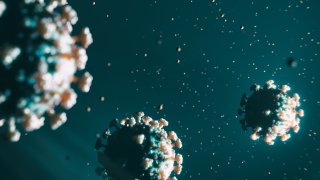
An international team of researchers led by scientists at UC San Diego School of Medicine have shown that the virus which causes COVID-19 can damage brain cell synapses, according to a report published Thursday.
By using tiny, self-organized, three-dimensional tissue cultures derived from stem cells called organoids, the scientists found that the SARS- CoV-2 virus infects cortical neurons to damage and destroy the synapses -- the connections between brain cells that allow them to communicate with each other.
San Diego News
"Vaccines and emerging treatments have reduced the health consequences of COVID-19 in most patients," said senior study author Alysson R. Muotri, professor in departments of pediatrics and cellular and molecular at UCSD School of Medicine. "But the phenomenon of Long COVID, characterized by persisting symptoms that include neurological impairment, remains poorly understood and without any specific remedy.
Get San Diego local news, weather forecasts, sports and lifestyle stories to your inbox. Sign up for NBC San Diego newsletters.
"This work helps explain some of the neurological symptoms of COVID- 19 and, more importantly, it suggests that an FDA-approved antiviral drug might be repurposed to restore infected brain cells to health and address long-term neurological outcomes of COVID-19," Muotri said.
The findings, published in Thursday's issue of PLOS Biology, report the antiviral drug sofosbuvir -- already an approved treatment for hepatitis C - - effectively inhibited SARS-CoV-2 replication and reversed damages in infected brain organoids. Organoids can mimic some organ functions.
According to the researchers, though primarily considered to be a respiratory disease, COVID-19 can cause temporary or long-lasting neurological symptoms in some patients, ranging from loss of taste and smell, brain fog, and psychological effects such as depression to stroke, epilepsy and a change in brain function or structure.
Researchers exposed the brain organoids to the virus, observed viral infection and replication and noted that the virus rapidly decreased the number of excitatory synapses in neurons within seven days post-infection. Excitatory synapses increase the firing action potential of a neuron, while their counterparts -- inhibitory synapses -- decrease that potential.
When infected organoids were treated with sofosbuvir, the researchers observed the viral replication was inhibited and neurological impairments were rescued or restored. According to the team, these findings echo earlier models that suggested sofosbuvir could be a treatment and previous research by Muotri and colleagues that found sofosbuvir effectively protected and rescued neural cells infected by the Zika virus.
"The bottom line is that sofosbuvir appears to have the potential to arrest or prevent the development of neurological symptoms in COVID-19 patients," Muotri said. "And because it has been shown to present no safety concerns in pregnant women, it might also be an option for preventing SARS-CoV- 2 transmission to their unborn children.
"Further studies and clinical trials are needed, of course, but these findings offer a path forward for treating a condition (Long COVID) that has so far stymied remedy for millions of people wordwide," she said.



